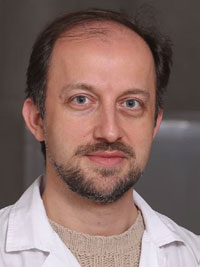Related Research Articles

Immunology is a branch of medicine and biology that covers the medical study of immune systems in all organisms. In such we can see there is a difference of human immunology and comparative immunology in veterinary medicine and animal biosciences.
Immunodeficiency, also known as immunocompromisation, is a state in which the immune system's ability to fight infectious diseases and cancer is compromised or entirely absent. Most cases are acquired ("secondary") due to extrinsic factors that affect the patient's immune system. Examples of these extrinsic factors include HIV infection and environmental factors, such as nutrition. Immunocompromisation may also be due to genetic diseases/flaws such as SCID.
Common variable immunodeficiency (CVID) is an immune disorder characterized by recurrent infections and low antibody levels, specifically in immunoglobulin (Ig) types IgG, IgM and IgA. Symptoms generally include high susceptibility to foreign invaders, chronic lung disease, and inflammation and infection of the gastrointestinal tract. CVID affects males and females equally. The condition can be found in children or teens but is generally not diagnosed or recognized until adulthood. The average age of diagnosis is between 20 and 50. However, symptoms vary greatly between people. "Variable" refers to the heterogeneous clinical manifestations of this disorder, which include recurrent bacterial infections, increased risk for autoimmune disease and lymphoma, as well as gastrointestinal disease. CVID is a lifelong disease.
Hyperimmunoglobulinemia E syndrome (HIES), of which the autosomal dominant form is called Job's syndrome or Buckley syndrome, is a heterogeneous group of immune disorders. Job's is also very rare at about 300 cases currently in the literature.

Selective immunoglobulin A (IgA) deficiency (SIgAD) is a genetic immunodeficiency, a type of hypogammaglobulinemia. People with this deficiency lack immunoglobulin A (IgA), a type of antibody that protects against infections of the mucous membranes lining the mouth, airways, and digestive tract. It is defined as an undetectable serum IgA level in the presence of normal serum levels of IgG and IgM, in persons older than 4 years. It is the most common of the primary antibody deficiencies. Most such persons remain healthy throughout their lives and are never diagnosed.
Nambudripad's Allergy Elimination Techniques (NAET) is a form of alternative medicine which proponents claim can treat allergies and related disorders. The techniques were devised by Devi Nambudripad, a California-based chiropractor and acupuncturist, in 1983, drawing on a combination of ideas from applied kinesiology, acupuncture, acupressure, nutritional management, and chiropractic methods.
Primary immunodeficiencies are disorders in which part of the body's immune system is missing or does not function normally. To be considered a primary immunodeficiency (PID), the immune deficiency must be inborn, not caused by secondary factors such as other disease, drug treatment, or environmental exposure to toxins. Most primary immunodeficiencies are genetic disorders; the majority are diagnosed in children under the age of one, although milder forms may not be recognized until adulthood. While there are over 430 recognized inborn errors of immunity (IEIs) as of 2019, the vast majority of which are PIDs, most are very rare. About 1 in 500 people in the United States are born with a primary immunodeficiency. Immune deficiencies can result in persistent or recurring infections, auto-inflammatory disorders, tumors, and disorders of various organs. There are currently limited treatments available for these conditions; most are specific to a particular type of PID. Research is currently evaluating the use of stem cell transplants (HSCT) and experimental gene therapies as avenues for treatment in limited subsets of PIDs.
Founded in 1943, the American Academy of Allergy, Asthma & Immunology (AAAAI) is a professional medical membership organization of nearly 6,800 allergist/immunologists and related professionals around the world with advanced training and experience in allergy, asthma and other immunologic diseases. The Academy is dedicated to the advancement of the knowledge and practice of allergy, asthma and immunology for optimal patient care.

Humoral immune deficiencies are conditions which cause impairment of humoral immunity, which can lead to immunodeficiency. It can be mediated by insufficient number or function of B cells, the plasma cells they differentiate into, or the antibody secreted by the plasma cells. The most common such immunodeficiency is inherited selective IgA deficiency, occurring between 1 in 100 and 1 in 1000 persons, depending on population. They are associated with increased vulnerability to infection, but can be difficult to detect in the absence of infection.
The European Academy of Allergy and Clinical Immunology (EAACI) is a non-profit organisation for European clinicians, researchers and allied health professionals in the field of allergy and clinical immunology, covering asthma, rhinitis, eczema and occupational allergy, food and drug allergy, severe anaphylactic reactions, autoimmune disorders, and immunodeficiencies.
Hans Dieter Ochs, is an immunologist and pediatrician. He is Professor of Pediatrics, Division of Immunology, Department of Pediatrics, University of Washington School of Medicine, Seattle.
Michael Stuart Gottlieb is an American physician and immunologist known for his 1981 identification of acquired immune deficiency syndrome (AIDS) as a new disease, and for his HIV/AIDS research, HIV/AIDS activism, and philanthropic efforts associated with HIV/AIDS treatment.
Charlotte Cunningham-Rundles, an American physician, is the David S. Gottesman Professor of Immunology at the Mount Sinai School of Medicine in New York City. a specialist in primary immunodeficiency disorders. She is also director of the Immunodeficiency Clinic at Mount Sinai Hospital, and the program director of their Allergy Immunology Fellowship training program.

Asghar Aghamohammadi is an Iranian (Persian) medical scientist, Immunologist and Immunology professor at the Tehran University of Medical Sciences. Aghamohammadi has studied in many institutes, including the Ahvaz Jundishapur University of Medical Sciences, Tehran University of Medical Sciences, Great Ormond Street Hospital and the University of Toyama. He has been one of the most distinguished Iranian Immunologists and awarded many national scientific prizes for his works, mostly in the field of primary immunodeficiency. Aghamohammadi is recognized internationally by hundreds of publications in this field and is currently the most important contributor to awareness of primary immunodeficiencies and to the management of immunodeficient patients in Iran. He has even been regarded as one of the most notable Iranian people in some lists.

Nima Rezaei is an Iranian scientist, a professor of clinical immunology and allergy at Tehran University of Medical Sciences, Associate Dean of International Affairs in the School of Medicine and the Director of Global Academic Program (GAP). Nima Rezaei is the mastermind, founder and current president of the Universal Scientific Education and Research Network (USERN). Rezaei is known for his research in Primary Immunodeficiencies, characterization and treatment. He initiated the Iranian Primary Immunodeficiency Diseases Registry (IPIDR) in 1999 under supervision of Professor Asghar Aghamohammadi, which earned him the best research project award in the 4th Avicenna festival.
Suranjith Seneviratne is a doctor from Sri Lanka who practices in allergology and immunology.
John Farrar Soothill was an English medical doctor. He began his career as a nephrologist and later became a paediatric immunologist at Great Ormond Street Hospital.

Andrii Ihorovych Kurchenko is a Ukrainian dermatologist, immunologist and allergologist, Doctor of Sciences in Medicine, Professor, head of department of Clinical Immunology and Allergology at O.Bohomolets National Medical University. He is an Expert of the Scientific and Expert Council at the State Expert Center of the Ministry of Health of Ukraine, a Fellow of the European and American Academies of Allergology and Clinical Immunology and Vice-President of the Ukrainian Society of experts in Immunology, Allergology and Immune rehabilitation (UTIAI). He is Deputy-editor of the journal "Immunology and Allergology. Science and Practice", as well as a co-author of the national textbooks "Clinical and Laboratory Immunology" (2012) and "Immunology" (2013).
Adam Fox is a paediatric allergy consultant and a child allergy specialist. He is President of the British Society of Allergy and Clinical Immunology, and he won the Raymond Horton-Smith Prize in 2012 for his doctoral thesis.

Arthur Fernandez Coca was an American immunologist known for his research on allergies.
References
- ↑ Professor Farhoudi's memorial Archived May 15, 2006, at the Wayback Machine